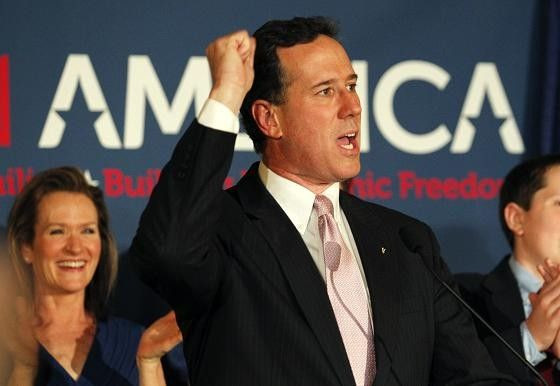Santorum Wins Louisiana Primary, But Still Trails Romney By Wide Margin

Former U.S. Sen. Rick Santorum of Pennsylvania won the Louisiana presidential primary election Saturday, CNN projected, based on exit polls, but he still trails former Massachusetts Gov. Mitt Romney by a wide margin in the 2012 Republican Party nomination race.
Romney went into the Louisiana contest with 563 delegates, according to the Washington Post Campaign 2012 Republican Primary Tracker. Santorum was a distant second with 263, former U.S. House of Representatives Speaker Newt Gingrich of Georgia was third with 135, and U.S. Rep. Ron Paul of Texas was fourth with 50.
In Saturday's primary in the region of the breathtaking bayou, 20 of the state's delegates will be allocated proportionately among candidates earning more than 25 percent of the vote. Another 23 delegates will be selected at the state Republican convention in June.
Louisiana Victory: No Likely Momentum
Santorum's victory in social conservative-heavy Louisiana cuts Romney's delegate lead slightly and gives the Santorum campaign at least bragging rights, if not outright momentum, but it remains to be seen if the Louisiana data point will be any different from previous installments of this long 2012 Republican nomination process -- namely, a moment in time that reflects the mood of voters in one state, on one day -- with little carryover to states that differ demographically from it.
And the very state-specific nomination process to-date is the reason why the term bragging rights is more appropriate than momentum regarding the significance of Saturday's Louisiana event. Although the state contains a large Catholic voting bloc, which is moderate nationally, Louisiana's Catholics are culturally more conservative than Catholics in the Northeast, Midwest, and West, so Santorum, who has emphasized social conservatism over other conservatism strands, was expected to and did perform well among these Louisiana voters.
However, the same strand of conservatism -- and hence support for Santorum -- cannot be expected from Catholics in Maryland (37 delegates), Wisconsin (42), and the District of Columbia (19), to which the Republican race moves on April 3, followed by an even more imposing test on April 24, when primaries in the more-moderate states of New York (95 delegates), Connecticut (28), Rhode Island (19), and Delaware (17) will be held, along with Santorum's native Pennsylvania (72).
In sum, Santorum's Louisiana victory has to be put in the category of a mere short-term bragging right: Santorum, as he did in Mississippi and Alabama, won in a state that fits his brand -- social conservatism -- but there was little evidence Saturday to suggest he can attract the economic conservatism-oriented and more-moderate voters away from Romney. Hence, one can say that Santorum still has not demonstrated that he's capable of inflicting a major defeat on Romney in a state where social conservatives are not dominant -- and it doesn't take a Harvard mathematician to conclude that if Santorum cannot defeat Romney soundly in the aforementioned April 3 primaries and in about a dozen more, he cannot gain enough ground to win the nomination.
Chatter To End GOP Nomination Process Could Grow To A Roar
What's more, if Santorum performs poorly on April 3, the strong chatter among GOP operatives and elected officials to pressure Santorum to end his campaign and also the 2012 Republican Party nomination race may grow into a full-throated roar. Party pros know that each day the Republican field spends discussing the appropriateness of contraception or whether Romney is conservative enough, that's one less day the GOP has to contrast its low taxes / limited government / economic growth / jobs vision for the United States with President Barack Obama's higher taxes on upper income groups / activist New Deal government / shared sacrifice / stimulus leads to more jobs vision.
Time, if the current job creation and gross-domestic-product growth trends continue, is not on the Republican Party's side. The U.S. economic expansion appears to be strengthening, and the economy -- aided by Obama's fiscal stimulus and the U.S. Federal Reserve's monetary policies -- is now creating about 200,000 new jobs per month and appears to be arcing toward 250,000 per month. If it does reach that level of job growth, the U.S. unemployment rate will decline, and historically voters re-elect presidents when the economy is experiencing strong job growth with the unemployment rate declining: the re-election of Bill Clinton (1996) and Ronald Reagan (1984) are two modern-era examples.
Hence, unless Santorum can show some strength outside the South and his social-conservative base soon, he will face what will likely be convincing pressure to end his campaign, and for an obvious reason: Time is beginning to creep up on the Republicans.
© Copyright IBTimes 2024. All rights reserved.




















